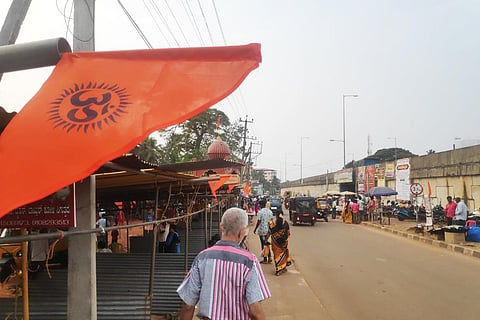

Possibly for the first time since Maariyamma began to be worshipped in coastal Karnataka, Muslim traders were not allowed to set up stalls during the annual Suggi Maari puje, held this year on March 22-23, in honour of the goddess. The temple management committee of the Hosa Maarigudi Temple in Kapu did not allow Muslim traders to set up shops after the Hindu Jagrana Vedike raised objections. Despite appeals from the traders, the temple did not withdraw its decision. (The jathre or the fair was not held for the past two years due to COVID-19 restrictions.)
Today’s youth might think such a move is common sense: Why should Muslims set up stalls during the jathre of a Hindu temple? And so, they supported and celebrated the ban, fuelled by ideas of “unity among Hindus” and “the power that Hindus have”. But how did Maariyamma come to Kapu? There is a story about Maariyamma that I grew up hearing, that gives us insights into how she came to be worshipped and how a temple was built for her in Kapu, which must be understood by today’s youth.
When Maariyamma spoke to humans for the first time, it was to a Muslim man. The story goes thus: When Basappa Nayaka ruled Karavali (as coastal Karnataka is called in Tulu/ Kannada), he was building forts in Kapu. (The British spelled it as Kaup, and the spelling has stuck). In Tulu, the word “kapu” means “to wait”. In the context of this story, however, it means soldiers standing guard at the fort.
One night, at the tank inside the fort that Basappa Nayaka built, the sound of someone having a bath was heard, and the fragrance of jasmine flowers emanated from the direction of the tank. A Muslim soldier went towards the tank and asked: “Who is it? Who’s there?” A bodiless voice answered: “I am Maari, I need a sanctuary that I can call home.” The soldier replied: “This is a fort, kanamma* and there are only soldiers here. How can I find such a sanctuary for you?” He added helplessly: “And I am a Muslim too, at that.” To his reply, Maari said: “Unite the four castes of this village and build me a gudi (home/temple).”
The Muslim soldier at the fort could have ignored Maari’s entreaty. But, he went ahead and united the four castes of Hindus. Even today, uniting Hindus divided by caste is no mean feat, but a Muslim man did it in around 1740 CE and built the Maari Gudi in Kapu.
After that, Karavali came under the rule of Tipu Sultan and so did the fort at Kapu. It is believed that Tipu encouraged soldiers to offer puje (worship) at the fort, and it was around that time that Maariyamma began to be known as Kaapudappe, meaning mother of Kapu (appe means mother in Tulu). Even today, swords and daggers from Tipu’s time still exist at the Hale Maariyamma Temple, which is believed to be Maari’s original sanctuary. Priests there still offer what is called the “havaldar puje”, a tradition that dates back to the soldiers who offered puje at Kapu fort, which no longer exists. Today, there are three Maariyamma temples in Kapu and the oldest one is called the Hale Maariyamma Temple.
Whether or not it’s because a Muslim man was the first to hear Maariyamma’s voice and breathe in the fragrance of the jasmine flowers she wore, until now, it was common for Muslim jasmine sellers to set up stalls during the jathre. Who knows, maybe Maariyamma would only be content if the jasmine flowers came from a Muslim person’s stall…
If there had been no Muslim soldier back then, and no Tipu Sultan, it is likely that Kapu’s Maarigudi may not have become the history that we know. Today, Hindus have given a new direction to the history and culture of the region by ganging up and driving out Muslim traders from the jathre of a temple that a Muslim man laboured to build by uniting the four Hindu castes.
Neither history nor the Maariyamma of folk traditions will forgive such ingratitude.
(Naveen Soorinje is a senior Kannada journalist and the co-founder of Journalists Study Centre-Karnataka. Translated and edited by Anisha Sheth.)
*Translator’s note: The word kanamma is used to address a woman. It connotes both familiarity and respect, and can be loosely translated as “my dear” as there is no English equivalent.